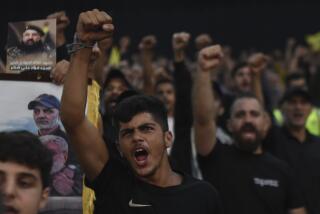2 Shiite Politicians Assassinated in Iraq
- Share via
BAGHDAD — Two prominent Shiite Muslim politicians were assassinated, Iraq’s largest political movement said Thursday, raising fears that religious strife was escalating during the volatile U.S.-led occupation.
Muhannad Hakim, an official with the Education Ministry, was gunned down Wednesday in front of his Baghdad home in a daytime drive-by shooting. Also Wednesday, a former official of Saddam Hussein’s Baath Party, Ali Zalimi, was beaten and shot repeatedly in the holy city of Najaf by a mob that accused him of carrying out Hussein’s repressions.
Sectarian clashes have occurred sporadically in Iraq since Hussein was ousted in April. Just over a week ago, a bomb exploded at the Ahbab Mustafa Mosque here, killing four Sunni Muslims and prompting accusations that Shiites were responsible.
“We are accusing Saddam’s remnants of being behind what happened,” said Ali Bayati, a member of the Supreme Council for Islamic Revolution in Iraq, or SCIRI, the political movement representing Iraq’s largest religious group. Shiites make up more than 60% of the population.
Early this morning, a huge explosion in western Baghdad toppled a building that housed offices of SCIRI and the Shiite militia known as the Badr Brigade, killing at least one woman from a caretaker family that lived on the property.
At least three other people among the 25 present were wounded.
Like many Iraqis who feel vulnerable as insurgents target the U.S. and its allies, Bayati said Thursday that he feared attacks would continue until foreign forces withdrew.
“This will not end until Iraqis are responsible for their own security,” he said. “We can manage our security affairs better on our own because we know our society and people.”
Coalition officials described the slaying of Hakim as an act of desperation by doomed insurgents trying to sabotage the country’s reconstruction and its recovery from dictatorship and war’s physical devastation.
“Clearly, the bitter-enders, supporters of the former regime, recognize which direction the train is heading,” said Dan Senor, a spokesman for the U.S.-led Coalition Provisional Authority. He warned of further assassinations and ambushes after Saturday’s capture of Hussein.
“Those who want this [reconstruction] to fail will likely increase attacks, not decrease them, because they want to throw this train off the tracks,” he said.
Hakim was a distant cousin of prominent Shiite leader Ayatollah Mohammed Bakr Hakim, who was killed in August with scores of others in a car bombing in Najaf at Iraq’s holiest Shiite mosque. The ayatollah was a brother of Governing Council member Abdelaziz Hakim, who is traveling in Europe with a delegation of the interim leaders.
Iraqis cooperating with the U.S.-led occupation have increasingly been targeted, said Army Brig. Gen. Mark Kimmitt, a military spokesman. He said 21 such attacks had occurred in the last week alone, killing and wounding more than a dozen policemen, regional government officials and religious figures.
Attacks on coalition troops have been relatively low compared with those against Iraqi civilians, Kimmitt said, and compared with November, when 111 coalition troops died, the heaviest casualties of the war and occupation.
In the Najaf slaying Wednesday, SCIRI officials reported that armed Shiites recognized and confronted Zalimi. The crowd erupted into a melee of beating and shooting. Shiites blame Zalimi for crushing their uprising after the 1991 Persian Gulf War.
The two killings intensified fears that Iraq could deteriorate into the kind of sectarian violence that ravaged Lebanon for decades.
Meanwhile, Iraqi fascination with the political aftermath of Hussein’s capture was obvious in the scramble to buy Thursday’s edition of the Al-Mutamar newspaper, owned by Governing Council member Ahmad Chalabi. The paper showed Chalabi, a returned exile, talking with Hussein in his jail cell Sunday and it printed the first picture of Hussein to surface since the videotape of his post-capture medical examination. Chalabi and three other council figures were taken to see Hussein at a coalition detention facility somewhere in Baghdad.
Meanwhile, U.S. troops continued to wage a major offensive against Hussein supporters and what the coalition believes are foreign fighters in Samarra, a tinderbox in the heart of the so-called Sunni Triangle. In the first 48 hours of the offensive, forces detained 88 suspected enemy fighters, Kimmitt said.
U.S. officers estimate there are 1,500 insurgents in the area, but Army Col. Frederick Rudesheim, commander of the 4th Infantry Division’s 3rd Combat Brigade, said his troops had encountered little resistance in the offensive.
Coalition officials also announced that they had embarked on a short but intensive training effort to prepare judges, prosecutors, lawyers and other judicial figures for the war crimes trials expected to be brought before a newly created Iraqi tribunal.
Human rights advocates such as Amnesty International and Human Rights Watch have complained that the tribunal needs international guidance and involvement to ensure fairness and protect the accused. They also object to Iraqi plans to reinstate the death penalty -- a sentence the vast majority of Iraqis want to see meted out to Hussein should he be found guilty, say most members of the interim government.
*
Times staff writer Chris Kraul in Samarra contributed to this report.
More to Read
Sign up for Essential California
The most important California stories and recommendations in your inbox every morning.
You may occasionally receive promotional content from the Los Angeles Times.











